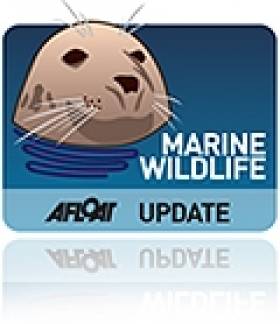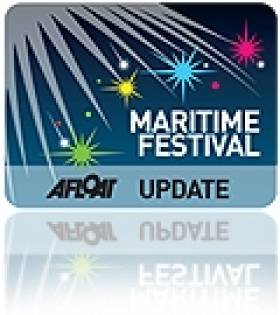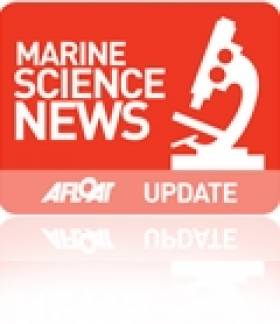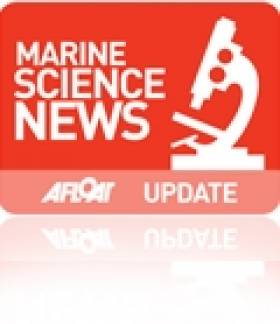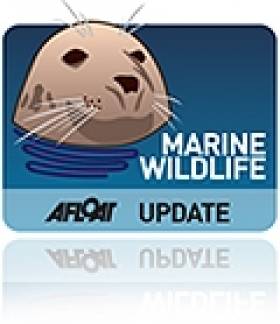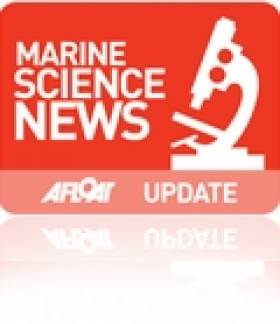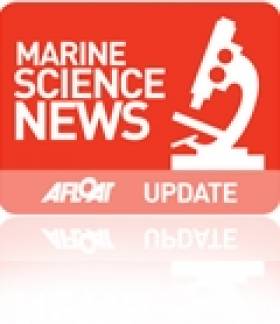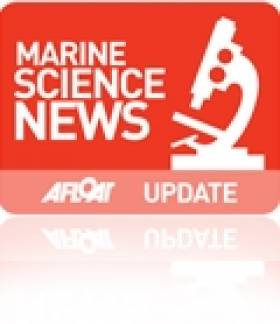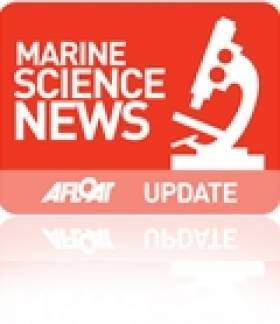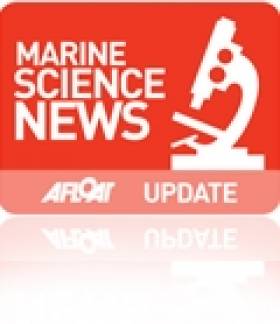Displaying items by tag: marine science
'Beach Safari' At Salthill Ahead Of Galway Sea Festival
#MarineWildlife - Young and old alike are invited to join a 'beach safari' from the lifeguard hut Grattan Beach in Salthill at 11.30am on Sunday 26 May, ahead of the first Galway Sea Festival.
Marine wildlife experts such as Amy Lusher of GMIT's Marine and Freshwater Research Centre and Dr Nóirín Burke of the Galway Atlantaquaria will be on hand to provide insights into an often ignored world of plants and animals, as the Galway Independent reports.
“The shore can sometimes appear to be devoid of wildlife, but when you start to look closely, there is a wonderful amount of activity going on - in the sand, under the rocks and in the rock pools," said Dr Burke.
“Grattan Beach is such an amazing resource to have on our doorstep here in Galway. Just a few hundred metres from the footpath where people walk and jog you can enter a habitat where life is completely different from our own."
A further chance to discover more about this secret world of the marine habitat will be available at the Galway Atlantaquaria's 'Family Funday' on 2 June in conjunction with the city's Galway Sea Festival celebrations.
As previously reported on Afloat.ie, "tens of thousands" of visitors are expected to flock to the City of the Tribes for the first Galway Sea Festival from 31 May till 3 June over the June bank holiday weekend.
Galway Expects Crowds For First Sea Festival
#Festivals - "Tens of thousands" of visitors are expected to flock to the City of the Tribes later this month for the first Galway Sea Festival over the June bank holiday weekend, according to the Galway Advertiser.
Dubbed the 'Mini-Volvo' by locals, the four-day event from 31 May till 3 June is hoped to recreate the celebratory atmosphere of last summer's successful Volvo Ocean Race finale, with a wide range of events both on and off the waters of Galway Bay.
Highlights include the festival regatta led by the Galway Bay Sailing Club's parades of sail on the Friday and Saturday evenings, and a traditional boat regatta by Badoiri na Cladaigh.
Watersports enthusiasts can get a taste of canoeing, diving, sea kayaking and windsurfing over the weekend, which also coincides with World Oceans Day - with family-friendly activities at the Galway Atlantaquaria on Sunday 2 June - and the International Canoe Polo Championships at Claddagh Basin.
Preceding the festival on Thursday 30 May will be the Bright Blue Sea Conference, a major international symposium on marine science, renewable energy, the environment and the 'blue economy'.
Last month it was reported that the Galway Sea Festival received the financial backing of Galway City Council, spurred by its aims to promote Galway as a maritime destination or commerce and tourism.
The Galway Advertiser has much more on the festival HERE.
'Longest River' Hailed A Success In Brussels
#MarineScience - A unique audio-visual performance intended to communicate the importance of marine science and research has been praised at a showcase event in Brussels.
The Marine Institute has collaborated with Galway-based choir Cois Cladaigh on The Longest River, in which a selection of Latin and English choral music and traditional Irish pieces from the 9th century onwards are put to a photo slideshow depicting marine scenes and species, and video footage of extreme environment under the deep ocean.
According to the Marine Institute: "The unique collaboration has created an innovative means of engaging new audiences and raising the awareness of the science of our oceans and the importance of the deep seas that support our life on earth."
As previously reported on Afloat.ie, EU Fisheries Commissioner Maria Damanaki - a co-patron of the initiative - said The Longest River "demonstrates the importance of international collaborations on ocean research".
The marine science literacy and communication event, described as "an arts, music and science fusion", was presented to an audience of over 200 people as part of the celebration of Ireland’s Presidency of the Council of European Union at Eglise du Saint – Sacrement in Brussels.
The Longest River was also presented to over 100 primary school pupils at the Ecole Europeenne de Brussels IV in the Belgian capital. The children were introduced to Irish musicians Eugene Lambe and Kathleen Loughnane who spoke about the history of their instruments and played the Uillean pipe and Irish harp.
Dr Brendan O’Connor, director of Cois Cladaigh, also taught the pupils how to perform the Rondes by Folke Rabe, a contemporary performance extending the expression of vocal sounds that cannot be found in any language, yet are possible sounds inspired from deep within the ocean.
Supporting the Marine Institute and the development of The Longest River, Dr O’Connor said: “This event has enabled Cois Cladaigh to raise its profile amongst a wider audience as well as contribute to the ethos of evoking innovative arts and science literacy, offering better communication to a broad societal audience."
The Marine Institute presented St Andrew's National Primary school students with Explorers Certificates of Participation today (Friday 26th April) at the Sea Life Centre in Bray.
Over the last couple of months, up to 200 primary school students on the East Coast of Ireland took part in a six week programme which included the installation of aquariums in nine schools as part of the Explorers Education Programme. "Using the aquariums to bring sea life into classrooms is an innovative way for students to learn about Ireland's marine species and resources", said Tomás Ó Briain, coordinator of the Explorers Project at Blackrock Education Centre.
"Workshop held for teachers and weekly visits to the schools to find out about the students' experiences and caring for the aquariums was a fantastic way to engage with the students on marine topics. The wide variety of projects produced at the end of the programme reflects the enthusiasm of the students for marine science and the development of important skills in science, literacy, maths and geography", he added. The installation of the Explorer aquarium tanks with a variety of sea life typically found in rockpools around the Irish coastline was carried out by the National Sea-Life Centre, Bray.
Pat Ó Súilleabháin, Director of the National Sea-Life Centre, Bray commented on the positive experience of caring for the aquariums on students, stating "It was wonderful to see the excitement and enthusiasm of the students when the aquarium tanks were installed in the classrooms. Through weekly newsletters and projects students became part of the marine world. The newfound eagerness of the students for marine science was visible when the groups visited Sea-Life, showing the invaluable contribution of the programme to marine education and science''.
Cushla Dromgool-Regan from the Marine Institute presenting pupils from St. Andrews National Primary School with Explorers Certificates of Participation
Congratulating the schools participation in the Explorers Education Programme, Cushla Dromgool-Regan of the Marine Institute highlighted the value of learning about the ocean and the effects it has on our daily lives. "The programme was originally developed by the Marine Institute eight years ago and is currently used by over 50 schools reaching over 5000 thousand students throughout Ireland''.
Director of Blackrock Education Centre, Pat Seaver, thanked the Marine Institute for their involvement, adding that "Raising awareness of marine education amongst students through science, mathematics, arts and geography along with other cross curricula activities brings long term benefits. The use of aquarium tanks in the classrooms enables students to develop vital observation and investigation skills at a young age, which can be applied to all elements of their education. The support provided by the Marine Institute for the Explorers Education Programme ensures that young students become interested in Ireland's marine resources and its future development early in their education".
A wide variety of marine based lesson plans, activities and science experiments, including details on the Real Map of Ireland, can be downloaded from www.explorers.ie. The Explorers Education programme was developed by the Marine Institute in collaboration with a number of key partners including Galway Atlantaquaria, Sealife Bray Aquarium, Blackrock Education Centre, Galway Education Centre and the Lifetime Lab, Cork.
The participating schools in the East Coast Explorers Education Programme 2013 were:
Our Lady of Mercy Convent School, Booterstown, Co. Dublin
St Philomena's School, Ravenswell, Bray, Co. Wicklow
New Court School, Bray, Co. Wicklow
St Andrew's National School, Bray , Co. Wicklow
St Laurence's National School, Greystones, Co. Wicklow
St Fergal's Senior National School, Bray, Co. Wicklow
St Kevin's National School, Sallynoggin, Co. Dublin
Scoil Cholmcille Senior National School, Ballybrack, Co. Dublin
St Declan's National School, Dublin 4
#MarineWildlife - Marine scientists have joined conservation groups in a chorus of opposition to the British government's apparent backtracking on plans to protect marine wildlife in the seas around the UK - including between Britain and Ireland.
As The Guardian reports, 86 academics have written to UK Environment Minister Richard Beynon, Environment Secretary Owen Paterson and Prime Minister David Cameron, urging them to rethink the neutering of proposals for Marine Protection Zones (MPZs) around the United Kingdom.
Earlier this month, as reported on Afloat.ie, environmentalists expressed disappointment over Westminster's slow progress on the issue, coming after news that just 31 of a potential 127 sites would be designated as protected.
It has since emerged that even these 31 sites so not include full protection for wildlife from destructive fishing and dredging activities.
Prof Callum Roberts of the University of York told The Guardian: "We have seen spectacular devastation in the Irish sea in the last 20 years, for example, due to scallop dredging and prawn trawling.
"As fish stocks get ever more squeezed, the use of ever more destructive gear is spreading. This is happening now and protection is long overdue."
He added: "Even if all 31 MPZs were established, it will fall far short of what is needed to recover and safeguard English seas."
The Guardian has more on the story HERE.
In association with the Marine Institute and sponsored by Culture Ireland and Tourism Ireland, the Longest River event will take place at Eglise du Saint-Sacrement, in Brussels on April 29th (from 8-9pm) as part of the celebration of Ireland's Presidency of the Council of European Union.
The Longest River event is under the patronage of both Ms Maria Damanaki and Ms Máire Geoghegan-Quinn, Members of the European Commission.
Commissioner Damanaki commented, "Our Atlantic Ocean is the bridge between all Atlantic States. I am delighted to be associated with the Longest River as it demonstrates the importance of international collaborations on ocean research – as such research will be central to the success of the Action Plan for the implementation of the Maritime Strategy proposed by the European Commission in order to deliver smart, sustainable and inclusive growth in the Atlantic Ocean area".
As part of our EU Presidency role, Ireland is supporting Commissioner Ms Maria Damanaki in her initiative to complete an Action Plan for the Atlantic. This Action Plan will focus on supporting exciting opportunities in a range of areas including the Marine ICT sector, ocean energy generation, marine and coastal tourism, marine biotechnology, as well as developing the seafood and aquaculture industry
Commissioner Máire Geoghegan-Quinn attended the inaugural performance of The Longest River during the ESOF2012 events in Dublin last July and commented, "I felt it was an excellent and moving example of how to communicate about big societal issues, such as climate change. The event showed how research and knowledge creation about our oceans is central to dealing with issues, given the key role they play in the life support system of this planet".
The Longest River performance will include Galway-based choir Cois Cladaigh directed by Dr Brendan O'Connor. The choir specialises in contemporary choral music from Ireland, Scandinavia, Eastern Europe and North America and also European music from the late 15th and early 16th centuries. Dublin native Eugene Lambe will perform on the uilleann pipe. Kathleen Loughnane, harpist and co-founder of the group Dordán will perform a mix of Irish and Baroque music. Deirbhile Ní Bhrolcháin will provide an innovative repertoire of traditional Irish sean-nós singing.
The science of our oceans and deep seas that support our life on earth will be presented by Professor John Delaney of the University of Washington. A unique fusion of poetry, photography and rarely filmed marine environments will reveal the importance the ocean and its impact on our daily lives.
The poem called Little Gidding by T.S Eliot expresses the perpetual deep ocean being the source of the Longest River – this being the last of earth yet to be discovered. "The idea of the ocean and its correlation of how we live on land highlights our maritime history. With the significant development in marine technology and marine sciences, the wealth of information and data collected will now enable us to understand and discover the oceans in a way that has never been done before," Professor Delaney explained.
The capabilities of marine scientists today will influence next generation exploration under the sea and also help develop strategies in exploring beyond our planet. At the leading edge of ocean and earth science research and education, Professor Delaney is developing an ocean observatory platform using remote sensor robotics over a sector of the Juan de Fuca tectonic plate and oceans with US NSF funding.
"A real-time natural laboratory under the sea which is internationally accessible and interactive, will provide scientists the tools to observe, forecast and predict short and long term oceanic activity, threats and opportunities," Delaney further said.
Multidisciplinary research and international cooperation is essential in achieving healthy marine ecosystems – which is a key goal of the Irish Government's Integrated Marine Plan for Ireland - Harnessing Our Ocean Wealth. With an aim to double Ireland's marine sectors contribution to GDP by 2020, having a better understanding of the oceans is key to generating social, cultural and economic benefits. "Communicating how research and innovation deliver societal benefits is important to the mission of the Marine Institute," according to Dr. Peter Heffernan, CEO of the Marine Institute.
Video footage of the hydrothermal vents discovered by an Irish led expedition on the RV Celtic Explorer in July 2011, in the middle of the Atlantic north of the Azores, will be shown at the Longest River event, illustrating the value of collaborating across national borders in order to extend Ireland's engagement with the global oceans.
Details of the event:
The Longest River – an arts, music and science fusion
Venue: Eglise du Saint – Sacrement
Chaussée de Wavre 205
1050 Bruxelles
Date / Time: Monday 29th April // 8-9pm
Irish Marine Innovations Applauded By Euro Space Agency
#MarineScience - Irish companies and researchers have distinguished themselves by developing innovative maritime services using satellite derived data in areas as diverse as marine renewables, fisheries protection, aquaculture and tourism.
That was the message from Dr Volker Liebig, director of Earth observation programmes with the European Space Agency at the opening of a conference on 'Space Innovation - Powering Blue Growth' at the National Maritime College of Ireland in Cork last week.
Minister for Research and Innovation Sean Sherlock, who opened the two-day event, said: “There are over 40 Irish companies currently engaged in ESA programmes, many of which are directly addressing global challenges such as climate change, sea-level rise, maritime surveillance and marine environmental monitoring.
"This is a growing industry and one which will guarantee high-quality jobs for Irish people and benefit our economy into the future.”
The conference - jointly organised by the ESA, the European Commission (DG Maritime Affairs), Enterprise Ireland, University College Cork’s Coastal and Marine Research Centre, the Irish Coast Guard and the Irish Naval Service - focussed on the contribution of space to maritime policy implementation; showed how new scientific results and innovative services assist in achieving targets set by the Integrated Maritime Policy for the European Union (IMP); and assessed how the ESA space development activities and the IMP can contribute to economic growth in Europe.
Geoffrey O’Sullivan, representing Marine Institute CEO Dr Peter Heffernan, said that the conference "ably demonstrated that Space Remote Sensing had a very positive contribution to make towards developing our blue economy.”
Examples given included fisheries management (including illegal, unreported and unregulated fishing); environmental assessment; detection of oil spills and harmful algal blooms; site survey for offshore renewable energy and aquaculture platforms; search and rescue; and maritime domain awareness (MDA).
O'Sullivan added that the Conference "validated the SMARTOCEAN (ICT and the Sea) Strategy being promoted by the Marine Institute, in identifying clear opportunities for Irish researchers and SMEs to harness their significant ICT and marine research skills and drawing on 'Big Data' provided by satellite sensors to develop of range of new products, services and applications relevant to local and global markets.”
Closing the conference, Marine Minister Simon Coveney commented that “increasing maritime situational and domain awareness is paramount in promoting a more inclusive approach to maritime development in delivering both the EU Blue Growth Strategy (2012) and Ireland’s Integrated Marine Plan (Harnessing Our Ocean Wealth) launched in 2012.
"Space based systems,” he said, “are a key component of an integrated and sophisticated maritime surveillance network.”
Advanced Marine Technologies Course Onboard RV Celtic Voyager
#MarineSCIENCE- Postgraduate students from the International SmartOcean Graduate Enterprise Initiative (ISGEI) recently had the experience of a two-day practical offshore course in advanced marine technologies onboard the national research vessel RV Celtic Voyager.
The course focussed on Sensors, Moorings and other autonomous marine monitoring systems and examined biological, chemical, acoustic and visual sensing, biofouling of sensors, communications and telemetry and sensor calibration.
This innovative pilot training course was developed and delivered by Dublin City University and the Strategic Marine Alliance for Research and Training (SMART) based in Galway-Mayo institute of Technology, in association with NUI Galway and Smart Bay Ireland and with ship-time provided by the Marine Institute.
According to Prof. Fiona Regan of DCU "Practical offshore courses enhance the skills base of the International Smart Ocean Graduates. We need to build capacity in this area and the SMART programme offers fantastic training opportunities for our researchers."
The practical considerations when deploying a sensor platform was also explored, in particular site assessment, determination of local hydrographic conditions, deployment
and recovery of mornings and in situ maintenance.
Other elements essential to working in an offshore environment were examined including navigation, safety at sea, and the risk assessment of operations at sea.
James Kelly of Tyndall National Institute is an ISGEI student and took part in the training: "The most valuable part of the training for me would be related to the sensor work and the information on biofouling, and as I am an electrical engineer, that is what I had hoped to get from the training".
SMART Coordinator Dr Pauhla McGrane stressed the collaborative effort involved in the development and delivery of the course stating "The ISGEI Sensors and Moorings course shows what can be achieved through effective collaboration of research and industry with the pooling of expertise and infrastructure to deliver innovative, novel training essential to the career development of emerging marine scientists and technicians".
The training was carried out under the Sea Change strategy with the support of the Marine Institute and the Marine Research Sub-programme of the National Development Plan 2007–2013.
#marine – MEPs voted to back Sean Kelly's proposals on the future growth of the EU's maritime sector, by an overwhelming 42-1 in favour, in a show of cross-party political support, in the European Parliament today (Tuesday).
"There is huge potential for the economic development of Ireland and Europe's marine resources which would directly benefit our coastal regions and spin-off industries," Mr Kelly commented after his opinion on the EU's Blue Growth strategy was adopted by the Committee on Regional Development.
The Ireland South MEP pointed to Foynes Port, Limerick in his own constituency as an example of future growth potential. "Blue Growth is about encouraging the development of more environmentally-friendly technologies and implementing them such as offshore wind and tidal energy resources. The innovation demonstrated by companies like Kerry-based Shannon LNG should be the inspiration here."
"Future policy must take a very regional approach in order to ensure our coastal communities have the opportunity to create new business and employment opportunities around their marine resources," Mr Kelly continued.
Today, MEPs voted with cross-party political consensus in endorsing Mr Kelly's call to drive a more balanced, integrated regional development approach to Europe's maritime strategy.
"We need a more inclusive strategy that will harness the potential of all regional ports and coastal hubs in order to create jobs, encourage technological development and innovation while also protecting biodiversity.
"For a truly effective strategy, the EU needs to support local communities and entrepreneurs with funding. However, financing options must be provided on a regional basis so all coastal areas have the chance to access financial support.
"I want to see direct supports for the development of aquaculture and blue biotech industries.
"I have stipulated funding must be available under EU programmes such as the European Regional Development Fund, Horizon 2020, the programme for the competitiveness of enterprises and SMEs (COSME), and the European Maritime and Fisheries Fund (EMFF)."
Mr Kelly also endorsed regional and cross-border maritime clusters and welcomed initiatives at Member State and regional level, such as Ireland's INFOMAR programme while stressing the need for policy coherence.
The opinion by Mr Kelly, as approved by MEPs, will now be forwarded to the European Commission for consideration.
#MarineScience - Gathering more than 60 marine scientists and research fleets operators from all European eco-regions, the kick-off meeting of the European project EUROFLEETS2 was held in Brest, France from 19-21 March last at the invitation of the French Research Institute for the Exploitation of the Sea (Ifremer) and the French Polar Institute Paul-Emile Victor (IPEV).
Thirty-one research organisations, research fleet managers, universities, and industrialists from 20 EU members states or associated countries participate in the EUROFLEETS2 project, whose main objective is the integration of research fleets currently managed at national level.
This project amplifies the effort initiated since 2009 with EUROFLEETS, which ends in August this year. Again co-ordinated by Ifremer, EUROFLEETS2 has a strong operational component. The project receives significant funding from the European Commission (€9 million of a total budget of approximately € 10.8 million) over four years.
“This provides a fantastic opportunity for Irish researchers to access a wide variety of vessel and equipment across Europe,” said Aodhan Fitzgerald of the Marine Institute’s Ocean Science Services Team. “The Marine Institute is proud and pleased to offer ship time on the national research vessels RV Celtic Explorer and RV Celtic Voyager as part of this project.”
EUROFLEETS2 is organised into three complementary activities – trans-national access; joint technological research; and networking - promoting information sharing, identification of new collaborative frameworks, development of common software tools and also testing innovative integration schemes.
Trans-national access offers the opportunity, fully funded by EUROFLEETS2, to international scientific groups to access research vessels on the basis of scientific excellence of the cruise proposals. After seven European calls for ship-time organised within targeted maritime regions, these scientific groups will embark on eight global/ocean and 14 regional European research vessels distributed all over European and world seas and oceans.
Two new initiatives are also planned in EUROFLEETS2: the first aims to attract scientific leaders and/or non traditional end users to make proposals for a flagship project involving several vessels (‘super-integration’ call for ship-time), while the second makes available an original set of five underwater vehicles or scientific embarked equipment.
Joint research, through dedicated actions, contributes to more modern infrastructures and enriched information services. Three key activities are considered: the definition of regional research vessels guidelines and generic designs, the development of innovative functionalities for underwater systems, and the implementation of data acquisition systems in standardised formats, contributing to a higher interoperability between research vessels.
Networking activity will consist in working groups for a better co-ordination of European research fleets. It will aim to establish a common strategic vision including polar research fleets, experiment new integration schemes like the virtual fleets and strengthen links with industry. Floating universities will complement the actions already undertaken for the training of young European scientists.
The long-term objective of EUROFLEETS2 is to prepare the insertion of a group of innovative and inter-operable regional research vessels in the ESFRI(European Strategic Forum on Research Infrastructures) roadmap.
Calls are now open for fully-funded ship time in polar and subpolar regions as well as for expressions of interest in super-integration.
For the former, EUROFLEETS2 can provide 200 fully funded days of ship time and 104 fully funded days of marine equipment to carry out ship-based research activities within any field of marine sciences. The application deadline is 24 May 2013.
As for the latter, the call seeks a cross-cutting proposal that needs to mobilise a combination of EUROFLEETS research vessels together with other appropriate scientific tools like national research vessels, research planes or onshore infrastructures with their own EU or national funding. All EUROFLEETS research vessels and equipment are available for this call. The expression of interest is not binding but desirable.
The deadline for applications is 15 May 2013. Logistically accepted pre-proposals will be invited to submit a full proposal from 14 June till 16 September 2013.
For more information and eligibility criteria visit www.eurofleets.eu.



























